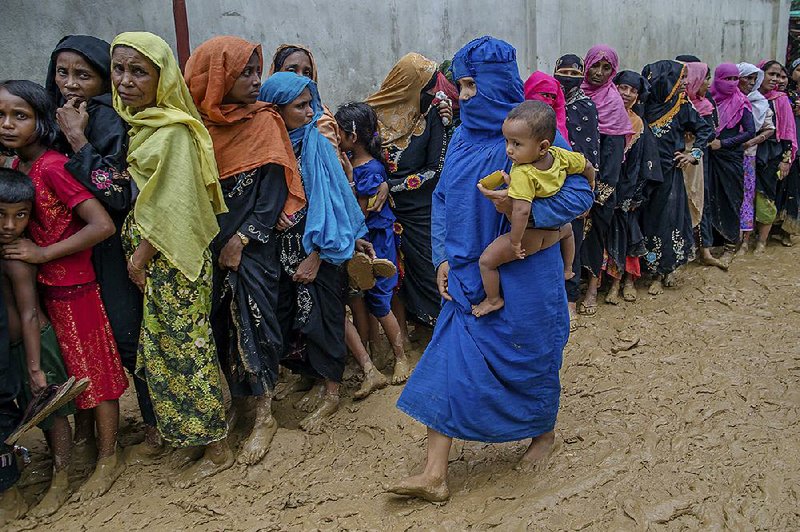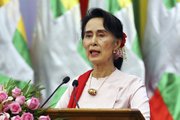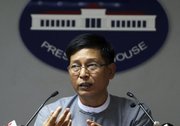COX'S BAZAR, Bangladesh -- With Burma drawing condemnation for violence that has driven at least 380,000 Rohingya to flee the country, the government said Wednesday that its leader, Aung San Suu Kyi, will skip this month's U.N. General Assembly meetings.
Suu Kyi will miss the assembly's ministerial session, which opens Tuesday and runs through Sept. 25, in order to address domestic security issues, according to presidential office spokesman Zaw Htay.
The U.N. Security Council condemned the violence in Burma's Rakhine state that sparked the mass exodus. Members called for "immediate steps to end the violence" and efforts to de-escalate the situation, ensure the protection of civilians and resolve the refugee problem.
Britain's U.N. Ambassador Matthew Rycroft said the Security Council's statement, which followed private consultations, was the first the U.N.'s most powerful body has made in nine years on the situation in Burma. He called it "an important first step."
While the Security Council was meeting, U.N. Secretary-General Antonio Guterres told reporters that ethnic cleansing is taking place against the Rohingyas.
Suu Kyi's appearance at last year's General Assembly was her first since her party won elections in 2015 and replaced a military-dominated government. Even then, however, she faced criticism over Burma's treatment of Rohingya Muslims, whom she did not mention. Members of the ethnic group are commonly referred to as "Bengalis" by many in Buddhist-majority Burma who insist they migrated illegally from Bangladesh.
Suu Kyi is not Burma's president -- her official titles are state counselor and foreign minister -- but she effectively serves as leader of the Southeast Asian nation.
Htay said that, with President Htin Kyaw hospitalized, second Vice President Henry Van Tio would attend the U.N. meeting.
"The first reason [Suu Kyi cannot attend] is because of the Rakhine terrorist attacks," Htay said. "The state counselor is focusing to calm the situation in Rakhine state."
Htay cited as other reasons the incitement of riots "in some areas" and the need to tend to security concerns, saying there are reports that "there will be terrorist attacks, and we are trying to address this issue."
Instead, Htay said, Suu Kyi will give a speech in Burma next week that will cover the same topics that she would have addressed at the United Nations.
The crisis began Aug. 25, when an insurgent Rohingya group attacked police outposts in Rakhine state. That prompted the Burmese military to start "clearance operations" against the rebels, setting off a wave of violence that has left hundreds dead and thousands of homes burned -- mostly Rohingya in both cases.
Htay said that of 471 "Bengali" villages in three townships, 176 are now completely empty and at least 34 others are partially abandoned.
He said there had been at least 86 clashes through Sept. 5, but none since then.
"What that means is, when the security forces are trying to stabilize the region, they have succeeded to a point," he said.
The government blames Rohingya for the violence, but analysts have raised doubts about its claims that Rohingya set fire to their own homes.
Many of the Rohingya who flooded into refugee camps in Bangladesh told of Burmese soldiers shooting indiscriminately, burning their homes and warning them to leave or die.
Suu Kyi, a Nobel Peace Prize laureate who lived under house arrest for many years under a military junta that ultimately gave way to an elected government, has faced a torrent of international criticism and pressure since the crisis began.
Bangladesh has been overwhelmed with the influx of Rohingya.
Thousands lined up Wednesday outside a makeshift relief center in the Cox's Bazar district that was distributing rice, sugar and other relief materials.
Mamunur Rashid of the International Organization for Migration said the supplies would be enough to help about 5,000 of the roughly 380,000 Rohingya who have arrived in Bangladesh in recent weeks.
The head of the U.N. refugee agency said humanitarian assistance to the fleeing Rohingya will improve "very, very quickly."
Asked why the response has been so slow, Filippo Grandi alluded to difficulties working in Bangladesh but said he hoped this will change as the scale of the crisis becomes more apparent.
Rohingya have faced decades of discrimination and persecution in Burma, where they are denied citizenship despite centuries-old roots in the country.
Burma is often called Myanmar, a name that military authorities adopted in 1989. Some nations, such as the United States and Britain, have refused to adopt the name change.
A Section on 09/14/2017



